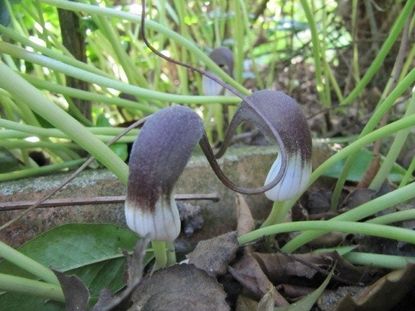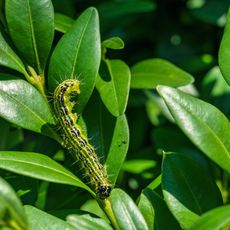Mouse Plant Care: How To Grow Mouse Tail Plants

The mouse tail plant (Arisarum proboscideum), or the Arisarum mouse plant is a member of the Arum family and a cousin to jack-in-the-pulpit. Native to Spain and Italy, this tiny, interesting woodland plant can be hard to find. That said, these plants are easy keepers, hardy to freezing temperatures, and perfect for novice gardeners. Let's learn more about growing mouse tail arums.
About Mouse Tail Plants
Mouse tail plants have extremely unusual, chocolate-colored flowers that are cylindrical and sit below the leaves with only little "tails" visible. When flowers bunch together, they give the appearance of a family of mice, hence the name. Leaves are arrow-shaped and a glossy, green color. Mice appear in very early spring and reach a mature height of just under 6 inches (15 cm.) with an interesting mat-forming habit. By August, however, in most locations, this plant becomes dormant. Used commonly as a groundcover, this plant will spread quickly and is an excellent option for hard-to-fill areas.
Growing Mouse Tail Arums
Mouse tail is easily propagated by dividing the tubers when the plant is dormant. It enjoys morning sun and afternoon shade and in a moist location, it will spread rapidly once established. It can be invasive, so if you do not want it to take over, plant it in a container. Mouse tail makes an ideal rock garden, window box, or container plant and provides an interesting spring display no matter where it is planted. Provide plenty of rich soil and mix in a little compost before planting. A 2 inch (5 cm.) layer of mulch will protect the plant over the winter and help to retain moisture.
Care of Mouse Tail Plants
Mouse plant care is really quite easy. Provide plenty of water while the plant is establishing and then water when the soil feels dry to touch. You will need to provide more water if you are growing plants in a container. Apply compost tea or liquid fertilizer every two weeks during the growing season for healthy foliage and blooming. Although this plant is resistant to most bugs and disease, spider mites are attracted to it. If you notice mites, spray the plant with an organic garlic pest control spray. The main risk to these cute little plants, however, is too much moisture during the dormancy period.
Gardening tips, videos, info and more delivered right to your inbox!
Sign up for the Gardening Know How newsletter today and receive a free download of our most popular eBook "How to Grow Delicious Tomatoes."
-
 Urban Composting Guide: How To Compost In The Middle Of The City
Urban Composting Guide: How To Compost In The Middle Of The CityUrban composting does not have to be daunting. You can compost in the city, and maybe even try some urban worm composting!
By Mary Ellen Ellis
-
 Shrub Diseases And Pests To Watch Out For
Shrub Diseases And Pests To Watch Out ForShrub diseases and pests can be challenging. Learn how to recognize and eradicate them before they can present a danger to your plants.
By Susan Albert